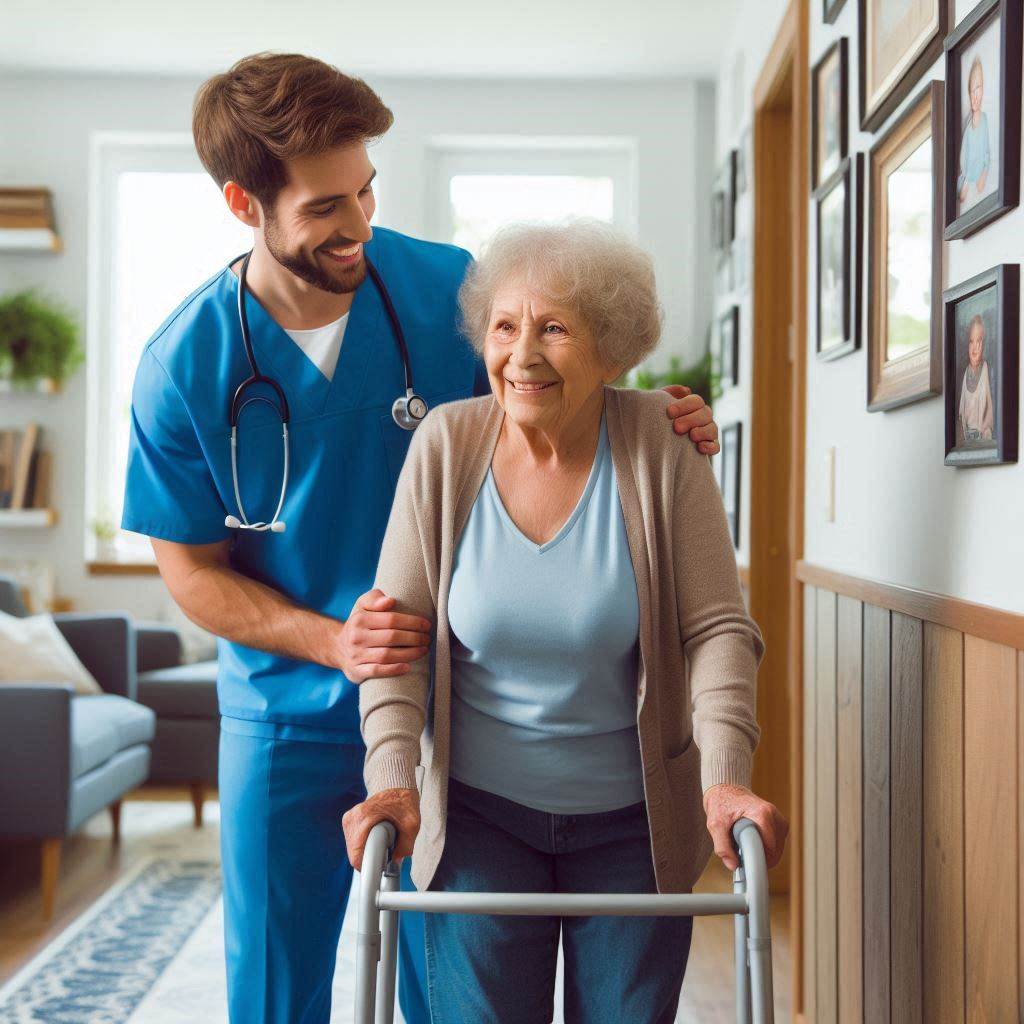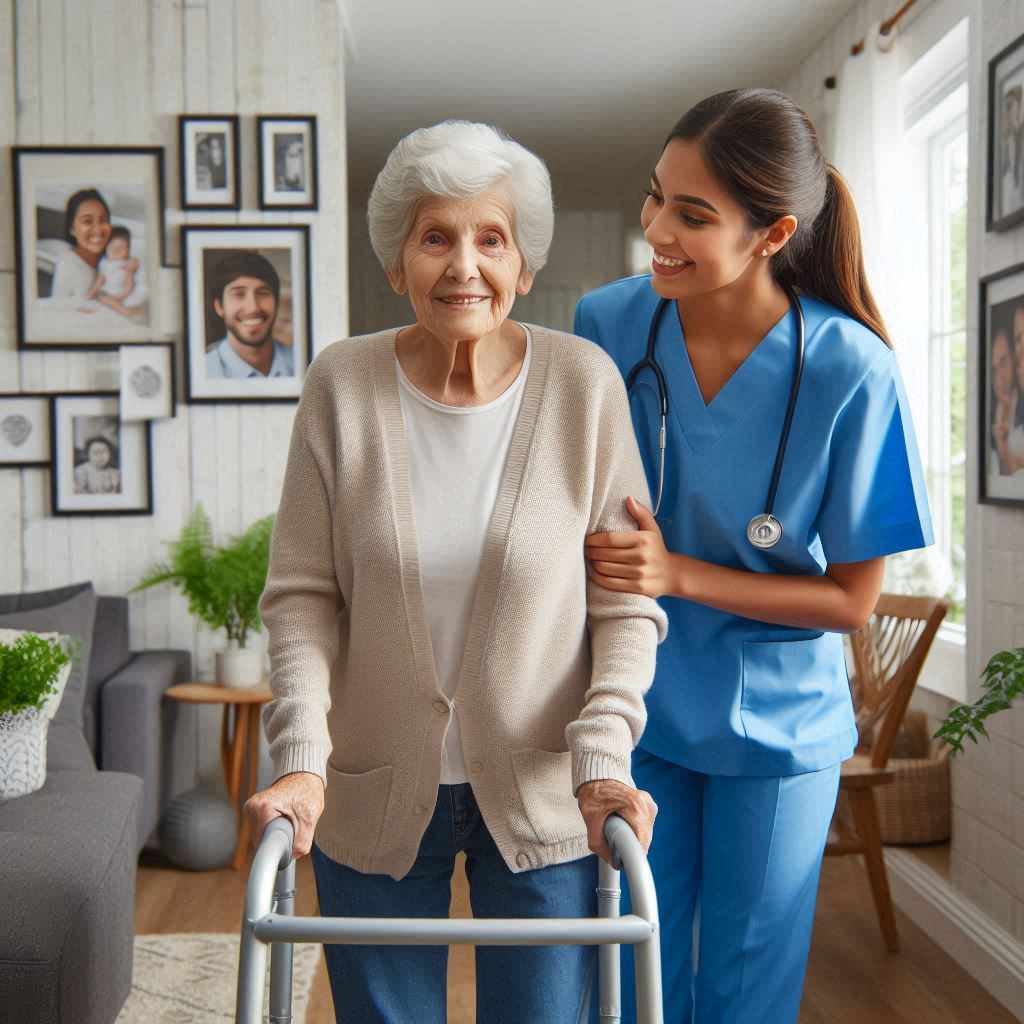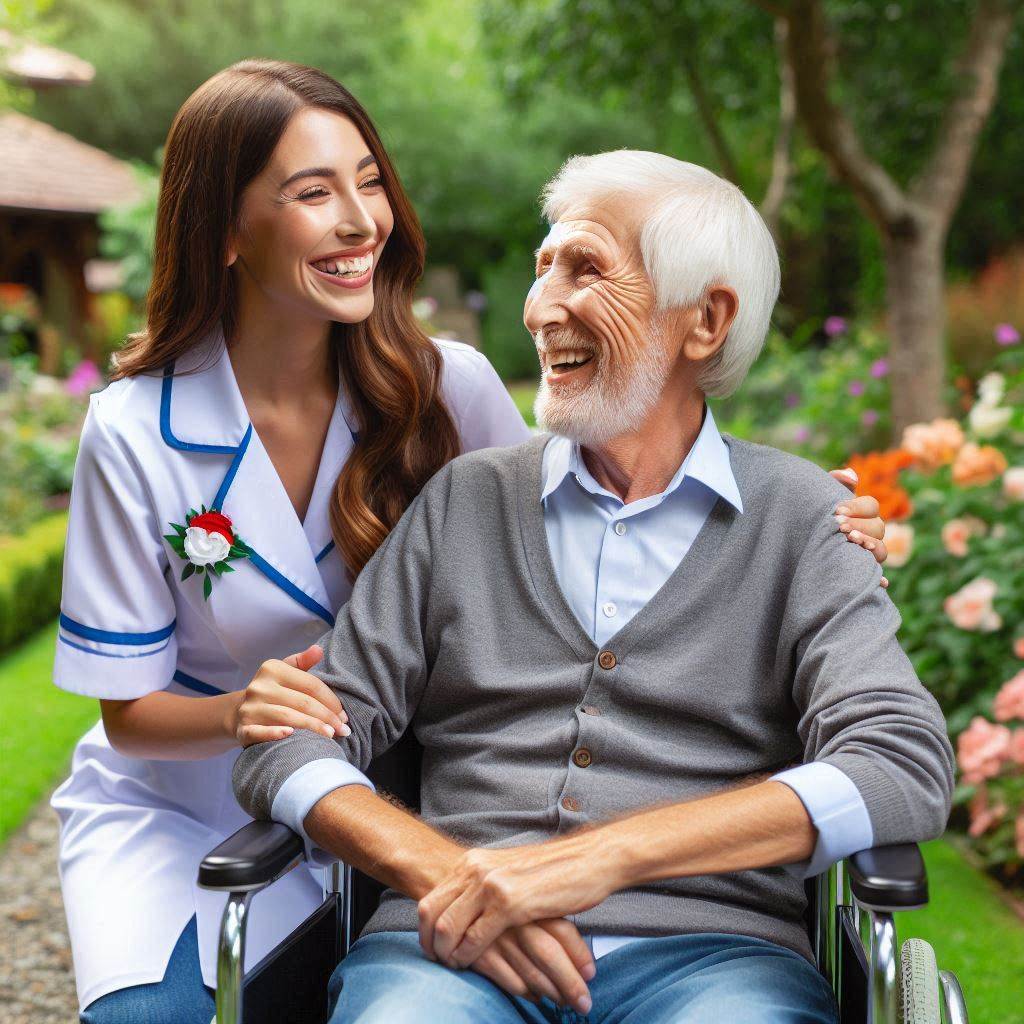Introduction
Home health aides play a vital role in palliative care, offering crucial support to patients facing serious illnesses. Home Health Aide in Palliative Care
Their presence significantly enhances the quality of life for these patients, focusing on physical comfort, emotional well-being, and spiritual solace for both patients and their families.
Home health aides are pivotal in palliative care settings, where their primary goal is to ensure comfort and dignity for patients.
They assist with daily activities, such as bathing and dressing, ensuring physical comfort.
Their compassionate care extends to emotional support, providing companionship and easing psychological distress.
Additionally, they offer spiritual support, fostering a sense of peace and acceptance.
Physical Support
Home health aides assist with daily living activities that can become challenging for palliative care patients.
These tasks include bathing, grooming, and mobility assistance, aimed at maintaining physical comfort and hygiene.
Their trained approach ensures that patients can remain in their homes, surrounded by familiar settings, contributing to their overall well-being.
In palliative care, emotional support is crucial for patients and their families.
Home health aides provide companionship, actively listen to patients’ concerns, and offer reassurance.
They build trusting relationships that help alleviate anxiety and fear, promoting a sense of security and emotional stability during a challenging time.
Recognizing the spiritual needs of patients, home health aides facilitate discussions on faith, meaning, and purpose.
They create a supportive environment where patients can explore their beliefs and find comfort in their spirituality.
This holistic approach enhances the patient’s overall well-being and supports their journey towards acceptance and peace.
Basically, home health aides are indispensable in palliative care, enhancing the lives of patients through comprehensive physical, emotional, and spiritual support.
Their compassionate care not only addresses the practical needs of patients but also fosters a sense of dignity and comfort.
By providing personalized assistance in the familiar environment of their homes, home health aides play a crucial role in improving the overall quality of life for patients and their families during the palliative care journey.
What is a Home Health Aide?
The role of a home health aide
A home health aide (HHA) plays a crucial role in providing compassionate care to patients within their homes.
They assist individuals who are elderly, disabled, or chronically ill with daily activities such as bathing, dressing, and medication reminders.
In palliative care settings, HHAs focus on enhancing quality of life for patients with serious illnesses.
They offer physical and emotional support, ensuring comfort and dignity throughout the patient’s journey.
The training and qualifications required to become a home health aide
To become a home health aide, one typically completes a formal training program.
This education covers basic health care skills, including monitoring vital signs, hygiene assistance, and safe transfer techniques.
Effective communication is paramount for HHAs, as they liaise between patients, families, and healthcare professionals.
Compassion and empathy are essential traits, fostering trust and easing emotional distress in palliative care settings.
Responsibilities in Palliative Care Settings
HHAs help manage pain and discomfort through proper positioning, medication reminders, and attentive care.
They also provide companionship and emotional support, recognizing the unique needs and preferences of each patient.
Generally, home health aides are integral members of palliative care teams, offering personalized care that enhances patients’ comfort and quality of life.
Their dedication and skills make a significant impact, ensuring patients and their families receive support during challenging times.
Read: Surgical Technologist Job Outlook: Demand and Opportunities
Physical Care Provided by Home Health Aides
The physical care tasks that home health aides perform for patients in palliative care
Home health aides play a crucial role in providing physical care to patients in palliative care settings.
They perform essential tasks that help maintain comfort and dignity for individuals facing advanced illnesses.
Home health aides are responsible for performing various physical care tasks for patients.
These tasks include assisting with daily activities such as bathing, dressing, and grooming.
They ensure that patients are clean and comfortable, promoting hygiene and preventing complications.
Importance of Proper Positioning and Mobility Assistance
Proper positioning is critical in palliative care to prevent bedsores and maintain circulation.
Home health aides are trained to reposition patients regularly, ensuring they are comfortable and preventing discomfort.
Mobility assistance is also crucial, helping patients move safely within their homes and maintaining their independence as much as possible.
Patients in palliative care often require sensitive personal care due to their illness.
Home health aides provide compassionate assistance with tasks that patients may find challenging or exhausting.
The role of home health aides in managing pain and discomfort through basic medical tasks
This includes toileting and ensuring patients’ personal hygiene needs are met with respect and dignity.
Home health aides assist in managing pain and discomfort through basic medical tasks.
They may help patients with medication reminders and ensuring they take prescribed pain relief medications as directed.
Additionally, aides provide comfort measures such as applying warm compresses or assisting with positioning to alleviate discomfort.
In a nutshell, home health aides play a vital role in palliative care by providing essential physical care to patients with advanced illnesses.
Their tasks range from personal hygiene assistance to managing pain and discomfort through basic medical interventions.
By ensuring proper positioning, offering mobility assistance, and providing sensitive personal care, home health aides contribute significantly to the comfort and quality of life of palliative care patients.
Emotional Support and Companionship
Emotional support plays a crucial role in palliative care, offering comfort and solace during challenging times.
Home health aides are pivotal in providing this support, offering reassurance and companionship to patients and their families alike.
In palliative care, patients often face emotional distress and anxiety due to their health conditions.
Home health aides can help by listening empathetically to their concerns, providing a comforting presence, and engaging in meaningful conversations that uplift spirits.
Patients undergoing palliative care often experience moments of uncertainty and fear.
Home health aides can alleviate these feelings by creating a safe and calming environment.
Simple gestures such as holding a patient’s hand, offering a gentle touch, or sitting quietly can provide immense comfort.
Home health aides build deep connections with patients and their families, fostering trust and understanding.
By spending time getting to know patients on a personal level, aides can tailor emotional support strategies to individual preferences and needs.
Beyond emotional support, home health aides assist with practical tasks that alleviate stress for patients and families.
This might include light household chores, meal preparation, or running errands, allowing families to focus more on emotional bonding.
Examples of Emotional Support
Aides can engage patients in reminiscing about happy memories, offering distraction from pain or discomfort.
They can also encourage patients to express their feelings openly, facilitating emotional release and promoting a sense of peace.
Creating a supportive environment involves ensuring patients feel safe and cared for in their own homes.
Aides may help arrange visits from spiritual or emotional counselors, depending on patient preferences, to further enhance emotional well-being.
In general, the role of home health aides in palliative care goes beyond physical assistance; it extends to providing essential emotional support and companionship.
By understanding the significance of emotional well-being, aides can greatly enhance the quality of life for patients and their families during challenging times.
Read: Interview Tips for Landing a Surgical Technologist Job
Household and Personal Care Assistance
The household tasks that home health aides can assist with for patients in palliative care
Home health aides play a crucial role in providing support to patients receiving palliative care.
They assist with various household tasks, ensuring the environment remains conducive to comfort and healing.
Tasks such as light cleaning, organizing spaces, and laundry help maintain cleanliness and order, contributing to the patient’s overall well-being.
Importance of Maintaining a Clean and Organized Environment
A clean and organized environment is essential in palliative care settings.
It promotes a sense of calm and reduces stress for patients and their families.
Home health aides ensure that surfaces are sanitized, clutter is minimized, and living areas are tidy.
This environment not only supports physical health but also enhances emotional and mental well-being during challenging times.
Home health aides assist patients with personal hygiene tasks like bathing, grooming, and dressing.
These activities are crucial for maintaining dignity and comfort, especially as patients navigate symptoms and treatments associated with palliative care.
Additionally, aides help with meal preparation, ensuring that patients receive nutritious meals tailored to their dietary needs and preferences.
In palliative care, every aspect of care provided by home health aides contributes to improving quality of life.
By focusing on household tasks, maintaining cleanliness, and assisting with personal care and meal preparation, aides create a supportive environment where patients can feel safe, comfortable, and respected.
Read: Continuing Education for Surgical Technologists: Why It Matters

Communication and Coordination with Healthcare Team
The importance of effective communication between home health aides, patients, families, and healthcare professionals
Effective communication is crucial in palliative care, ensuring all parties—home health aides, patients, families, and healthcare professionals—are on the same page.
Home health aides play a pivotal role as liaisons, bridging gaps between patients and the healthcare team.
They provide vital updates on the patient’s condition, ensuring comprehensive care management.
Clear and empathetic communication fosters trust and understanding among all involved in palliative care.
Home health aides ensure that patients’ needs and preferences are conveyed accurately to healthcare professionals.
This facilitates personalized care plans and enhances the overall quality of life for patients in palliative care.
Home health aides act as a vital link between patients and the healthcare team.
They convey patients’ concerns, preferences, and health updates to doctors, nurses, and other caregivers.
This role ensures that all aspects of the patient’s care are well-coordinated and aligned with their palliative care goals.
Providing Updates on Patient’s Condition
Regular updates on the patient’s condition are essential for adjusting care plans and ensuring timely interventions.
Home health aides observe and report changes in the patient’s health status, medication effectiveness, and overall well-being.
This information enables healthcare professionals to make informed decisions and provide appropriate support.
Home health aides assist in implementing and monitoring care plans tailored to the patient’s palliative care needs.
They collaborate with healthcare professionals to ensure that treatments, medications, and supportive therapies align with the patient’s goals and preferences.
This proactive approach helps maintain comfort and dignity throughout the palliative care journey.
In summary, home health aides play a crucial role in palliative care by facilitating effective communication and coordination among patients, families, and healthcare professionals.
Their role as liaisons ensures that patients receive personalized care that respects their wishes and enhances their quality of life.
By providing updates on the patient’s condition and managing care plans, home health aides contribute significantly to the holistic care approach in palliative settings.
This structured approach not only supports the patient’s physical and emotional well-being but also ensures that their palliative care experience is as comfortable and dignified as possible.
Effective communication and coordination empower home health aides to make meaningful contributions to the multidisciplinary team, ultimately improving outcomes for patients in palliative care.
Read: Networking Tips for Aspiring Surgical Technologists
End-of-Life Care and Bereavement Support
Address the sensitive topic of end-of-life care and the role of home health aides in supporting patients and families during this challenging time
Home health aides play a crucial role in palliative care, especially during the sensitive phase of end-of-life care.
They are trained to provide compassionate support to patients and their families, ensuring comfort and dignity throughout the final stages of life.
In palliative care, home health aides focus on enhancing the quality of life for terminally ill patients.
They assist with daily activities, such as personal hygiene and medication management, with empathy and respect.
By maintaining a comforting environment, aides help alleviate physical discomfort and promote emotional well-being.
Respecting the patient’s wishes and preferences is paramount in palliative care.
Home health aides are trained to listen actively and respond to individual needs sensitively.
They foster a trusting relationship that honors the patient’s autonomy and ensures dignified care until the end.
Transform Your Career Today
Unlock a personalized career strategy that drives real results. Get tailored advice and a roadmap designed just for you.
Start NowImportance of Bereavement Support
After the patient passes away, home health aides continue to support families through the grieving process.
Bereavement support is crucial as it helps families cope with the loss and adjust to life without their loved one.
Aides offer emotional support, connect families with community resources, and provide guidance on mourning rituals.
Home health aides extend their compassionate care beyond the patient to include family members.
They offer reassurance, actively listen to concerns, and provide practical assistance during this emotionally turbulent period.
By being a pillar of support, aides help families navigate the complexities of grief with empathy and understanding.
In fact, the role of home health aides in palliative care is multifaceted, particularly in end-of-life and bereavement support.
Through compassionate care, they ensure that patients experience comfort and dignity in their final days.
Moreover, their support extends to families, offering solace and practical assistance during the grieving process.
Home health aides are instrumental in providing holistic care that honors the dignity and wishes of patients while supporting families through one of life’s most challenging transitions.
Conclusion
Home health aides (HHAs) are crucial in palliative care, providing essential support and comfort to patients facing serious illnesses.
Their role extends beyond medical care to encompass emotional and practical assistance for patients and their families.
HHAs assist with daily activities such as bathing, dressing, and feeding, ensuring comfort and maintaining hygiene.
They also provide companionship, offering emotional support and alleviating loneliness.
Emotional support from HHAs helps patients cope with the psychological challenges of their condition.
It fosters a sense of companionship and reduces anxiety, contributing to overall well-being.
Practical Assistance Provided by Home Health Aides
In addition to personal care, HHAs help with household tasks like meal preparation and light housekeeping.
These services ensure that patients can focus on their health without worrying about daily chores.
HHAs undergo specific training to handle the unique needs of palliative care patients.
This includes understanding pain management, recognizing symptoms, and providing compassionate care tailored to individual preferences.
HHAs work closely with nurses, doctors, and hospice teams to coordinate care plans and ensure holistic support for patients.
Their observations and insights are invaluable in adjusting care strategies.
In summary, home health aides play a vital role in palliative care by offering compassionate support, assisting with daily tasks, and providing emotional comfort to patients and families.
Their training and collaborative efforts with healthcare teams enhance the quality of life for those in palliative care.
It’s essential to recognize and appreciate the invaluable contributions of HHAs in improving patient outcomes and ensuring dignified end-of-life care.
[E-Books for Sale]
The Big Book of 500 High-Paying Jobs in America: Unlock Your Earning Potential
$19.99 • 500 High-Paying Jobs • 330 pages
Explore 500 high-paying jobs in America and learn how to boost your career, earn more, and achieve success!
See All 500 High-Paying Jobs of this E-Book
1001 Professions Without a Degree: High-Paying American Jobs You Can Start Now
$19.99 • 1001 Professions Without a Degree • 174 pages
Discover 1001 high-paying jobs without a degree! Unlock career tips, skills, and success strategies for just $19.99!




